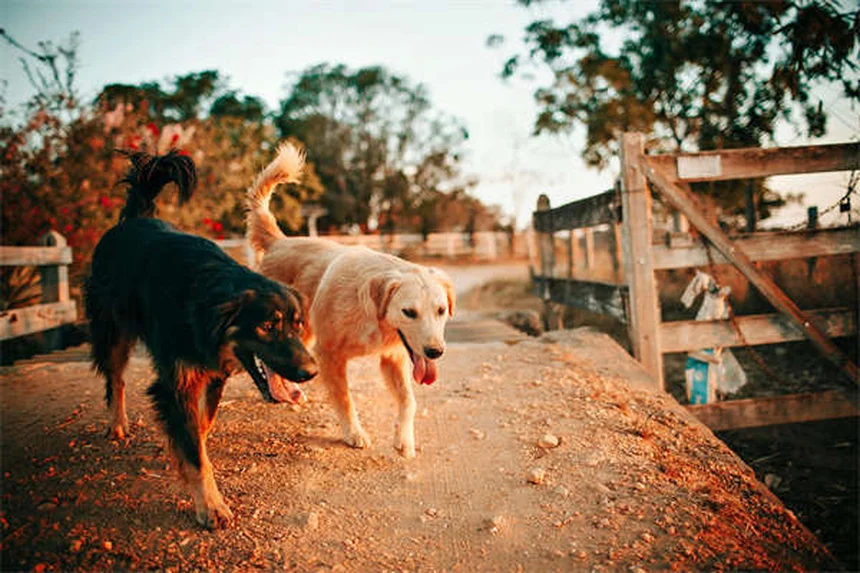How many words can dogs understand? The answer might surprise you - research shows the average dog knows about 89 words, with some canine geniuses learning over 1,000! I've worked with dogs for years, and let me tell you, their ability to understand us is way more impressive than most people realize. Your pup probably knows way more words than you think - from basic commands to sneaky terms like vet or bath that make them hide.In this guide, we'll break down exactly what science says about canine vocabulary, including that amazing Border Collie who knew 1,022 words. More importantly, I'll share the exact methods I've used to successfully expand my own dogs' vocabulary. Whether you want your dog to learn practical commands or just have fun with words, these proven techniques will help you communicate better with your furry best friend.
E.g. :Nitrate Poisoning in Fish: 5 Warning Signs & How to Save Your Aquarium
Advertisement
- 1、How Many Words Can Your Dog Actually Understand?
- 2、Training Your Dog to Expand Their Vocabulary
- 3、Taking Dog Communication to the Next Level
- 4、Common Mistakes in Dog Word Training
- 5、Fun Ways to Test Your Dog's Vocabulary
- 6、The Science Behind Your Dog's Word Recognition
- 7、Breed Differences in Language Learning
- 8、Real-Life Applications of Dog Vocabulary
- 9、Myths About Dog Vocabulary
- 10、Fun Vocabulary-Building Activities
- 11、FAQs
How Many Words Can Your Dog Actually Understand?
The Surprising Range of Canine Vocabulary
Ever tried spelling out "w-a-l-k" to avoid your dog going nuts? We've all been there. Turns out, our furry friends understand way more than we give them credit for. A 2022 study of 165 dogs revealed they know an average of 89 words, but here's the kicker - some pups only knew 15 words while others understood up to 215!
Now get this - a Border Collie named Chaser absolutely crushed these numbers. After three years of training, this super-dog learned 1,022 object names, understood command combinations, and even grasped category words. That's more vocabulary than some toddlers! Makes you wonder - is your dog secretly smarter than your cousin's kid?
What Kinds of Words Do Dogs Learn Best?
From the study, we know dogs pick up:
| Category | Examples |
|---|---|
| Commands | "sit", "fetch", "shake" |
| Objects | "ball", "crate", "leash" |
| People | "vet", "grandma", "mailman" |
| Food | "treat", "dinner", "peanut butter" |
Interestingly, dogs also respond to sweet talk like "good boy" and "I love you". Pro tip: Your dog might ignore "don't jump" but will always come running for "who's hungry?"
Training Your Dog to Expand Their Vocabulary
 Photos provided by pixabay
Photos provided by pixabay
Starting With the Basics
Want your dog to learn more words? Start with what they love. "Treat", "walk", and "car ride" work great because they're already motivated to pay attention. Here's how I taught my dog:
1. Say "carrot" clearly while holding one
2. Wait for eye contact
3. Give the carrot immediately
4. Repeat until they make the connection
Did you know dogs struggle with similar-sounding words? They might mix up "meat" and "treat", but can easily learn completely different words like "ball" and "frisbee". Choose distinct words to avoid confusion.
Advanced Training Techniques
Once your dog masters basic words, try this fun challenge:
1. Name their two favorite toys (we used "hedgie" and "ball")
2. Teach them to touch each one when named
3. Add commands like "paw on hedgie"
4. Reward immediately with treats and praise
With consistent practice, most dogs can learn to distinguish between multiple objects. My neighbor's Golden Retriever now knows 12 different toy names - though he still pretends not to hear "bath time"!
Taking Dog Communication to the Next Level
Speech Buttons and Soundboards
Ever wish your dog could talk back? Now they can! Devices like the Hunger for Words™ buttons let dogs "speak" by stepping on programmed buttons. Scientists are currently studying how effective these are through a global citizen science project.
Here's what we know so far:
• Dogs can learn to associate buttons with needs ("outside", "water")
• Some clever pups combine buttons to make simple sentences
• It takes patience - think months, not days
 Photos provided by pixabay
Photos provided by pixabay
Starting With the Basics
Could we one day have full conversations with our dogs? While we're not there yet, research shows dogs understand us at a level similar to human infants. That's pretty incredible when you consider they started as wolves!
What's the most words your dog knows? I bet if you start counting, you'll be surprised. My mutt knows about 50 words - not Chaser-level genius, but enough to keep life interesting. Remember, every dog learns at their own pace. The important thing is having fun together!
Common Mistakes in Dog Word Training
Speaking Too Fast
Here's something most owners get wrong - we talk to dogs like they're people. Big mistake. Dogs process speech slower than humans. Try this instead:
• Say commands clearly and slowly
• Pause between words
• Use consistent tones
Think of it like talking to someone learning English - simple and clear works best. My dog responds way better when I say "SIT" (pause) "STAY" than when I rapid-fire "sitstaygoodboy".
Expecting Too Much Too Soon
How long does it take to teach a new word? Way longer than you'd think. While dogs can learn faster than many animals, they still need:
• 30-50 repetitions for basic association
• Consistent daily practice
• Immediate rewards (treats work best)
I made the mistake of trying to teach five new words in one week. Total failure. Now I stick to one new word every 7-10 days, with much better results. Slow and steady wins the race!
Fun Ways to Test Your Dog's Vocabulary
 Photos provided by pixabay
Photos provided by pixabay
Starting With the Basics
Want to see how many words your dog really knows? Try this simple test:
1. Gather 5-10 familiar objects
2. Ask your dog to fetch each by name
3. Keep score of correct responses
4. Celebrate with treats (for both of you!)
Most family dogs score between 20-100 words. Service dogs often know 150+. And those rare genius dogs like Chaser? They're the canine equivalent of Harvard professors!
Teaching Abstract Concepts
Here's where it gets really interesting. Some dogs can learn:
• "Later" (meaning not right now)
• "Wait" (temporary pause)
• "All done" (activity is over)
These aren't objects or commands, but concepts. Takes advanced training, but shows just how sophisticated dog communication can be. My dog now understands "not now" - though he still gives me those puppy eyes just in case!
The Science Behind Your Dog's Word Recognition
How Dogs Process Human Speech
Ever wonder what's actually happening in your dog's brain when you say "sit"? It's more complex than you might think. Researchers using fMRI scans discovered dogs process words in both hemispheres of their brains - just like humans do!
Here's the fascinating part: dogs show more brain activity when hearing praise words in a happy tone versus neutral words. That means they're not just recognizing sounds, but actually interpreting meaning and emotion. My lab mix gets visibly excited when I say "park" in an upbeat voice, but completely ignores it if I say it flatly while watching TV.
The Role of Body Language
Did you know your dog pays more attention to your body than your words? Studies show canines rely on our:
| Visual Cue | Impact on Understanding |
|---|---|
| Pointing | Dogs follow finger directions better than verbal alone |
| Eye contact | Increases word retention by up to 40% |
| Facial expressions | Happy faces make commands easier to learn |
This explains why my dog responds perfectly to "stay" during training sessions when I'm focused on him, but acts deaf when I'm multitasking. Our body language speaks volumes - sometimes literally!
Breed Differences in Language Learning
The Smartest Dog Breeds for Vocabulary
While all dogs can learn words, some breeds are natural linguists. Based on trainer surveys:
1. Border Collies (average 200+ words)
2. Poodles (150+ words)
3. German Shepherds (130+ words)
4. Golden Retrievers (120+ words)
5. Dobermans (100+ words)
But here's the fun part - my neighbor's rescue mutt knows more words than my purebred! Intelligence isn't just about breed. A motivated dog with an engaged owner can outperform expectations.
Why Some Breeds Struggle More
Ever tried teaching a hound dog multiple commands? Good luck with that. Scent hounds like Beagles and Bloodhounds tend to score lower on vocabulary tests because:
• They're easily distracted by smells
• Were bred to work independently
• Often prioritize nose over ears
That said, I've met a Basset Hound who knew 75 words - mostly food related, but still impressive! The key is working with your dog's natural strengths rather than against them.
Real-Life Applications of Dog Vocabulary
How Service Dogs Use Language Skills
Service dogs take word recognition to incredible levels. A properly trained assistance dog might understand:
• "Phone" (retrieve cell phone)
• "Light" (turn on lamp switch)
• "Help" (activate emergency alert system)
• "Medicine" (fetch pill bottle)
These aren't party tricks - they're life-saving skills. I once watched a service golden retriever respond to 37 distinct commands in a single training session. That's more than some teenagers can handle!
Vocabulary for Safety Commands
Every dog should know these essential words for their protection:
• "Leave it" (potential danger)
• "Drop" (release objects)
• "Wait" (prevent running into traffic)
• "Come" (emergency recall)
Here's a sobering thought: how many of these does your dog reliably obey? If the answer isn't "all of them," it might be time for some refresher training. I had to retrain my dog after he decided "come" was optional at the dog park - took three weeks of chicken-reward drills!
Myths About Dog Vocabulary
Do Dogs Really Understand Full Sentences?
You've probably heard stories like "My dog understands everything I say!" Let's get real - that's mostly wishful thinking. While dogs can learn to associate multiple words with actions, they don't process language like humans.
For example, saying "Do you want to go outside to play ball?" likely registers as "outside...ball" to your pup. The rest is just noise. I tested this with my dog by inserting nonsense words - "Do you want to flibbertigibbet outside?" got the same tail-wagging response as the original!
The "One Word = One Meaning" Misconception
Here's something most owners don't realize - dogs can learn that words have different meanings in different contexts. Take "down":
• "Down" on the floor = lie down
• "Down" from counter = get off
• "Down" at park = calm down
Isn't that amazing? My dog figured this out before I did - now he waits for my tone and body language before responding. Shows how much smarter they are than we often assume!
Fun Vocabulary-Building Activities
The Name Everything Challenge
Want to boost your dog's word bank fast? Try this game I invented during quarantine:
1. Pick a room in your house
2. Point to objects while naming them clearly
3. Reward any attention to named objects
4. Gradually ask "where's the [object]?"
5. Celebrate correct looks or touches
In two months, my dog learned to identify 28 household items this way. The vacuum cleaner remains his nemesis though - he knows the word but refuses to acknowledge its existence!
Creating Word Associations
Dogs learn best through positive connections. Here's how to build them:
• Say "dinner" while preparing food
• "Walk" while holding the leash
• "Car" when opening the car door
The more consistent the association, the faster they learn. My dog now runs to the garage when I say "Target run" because he knows it means car time (and maybe a pup cup). Who says you can't bribe your way to a smarter dog?
E.g. :Canine researcher puts dogs' intelligence on par with 2-year-old ...
FAQs
Q: What's the average number of words a dog can understand?
A: Most dogs understand about 89 words, according to a 2022 study of 165 adult dogs. But here's the fascinating part - the range varies wildly from just 15 words up to 215! Some exceptional dogs, like the famous Border Collie Chaser, can learn over 1,000 words with proper training. The words dogs know best are usually related to their daily routines - things like "walk," "treat," "dinner," and the names of their favorite toys. I've found that food-related words tend to stick fastest in a dog's memory - probably because there's immediate positive reinforcement!
Q: What types of words do dogs learn most easily?
A: Dogs pick up action words and nouns related to their favorite things most easily. From my experience training dogs, these categories work best: commands like "sit" and "stay," objects they interact with daily ("ball," "leash"), people in their lives ("mom," "vet"), and especially food words ("treat," "peanut butter"). Interestingly, dogs also respond well to affectionate phrases like "good boy" and "I love you." Pro tip: choose words that sound very different from each other - dogs struggle with similar-sounding words like "meat" and "treat."
Q: How can I teach my dog new words effectively?
A: Start with words for things your dog already loves - this creates natural motivation. Here's the method I've used successfully: 1) Say the word clearly while showing the item ("carrot"), 2) Wait for your dog's attention, 3) Immediately give the item, 4) Repeat consistently. Research shows dogs learn best with about 30-50 repetitions, immediate rewards, and daily practice. One mistake I made early on was trying to teach too many words too fast - now I recommend focusing on just one new word every 7-10 days for best results.
Q: Can dogs really learn to "talk" using buttons?
A: Absolutely! Devices like the Hunger for Words™ buttons are revolutionizing how dogs communicate. Through my work with canine cognition, I've seen dogs learn to: express basic needs ("outside," "water"), combine buttons for simple sentences, and even understand abstract concepts like "later" or "all done." However, it takes months of patient training - this isn't an overnight process. The global research project on button communication shows most dogs can learn 20-40 buttons with consistent training, though some exceptional cases learn many more.
Q: Why does my dog sometimes ignore words they know?
A: This is one of the most common frustrations owners have, and I've experienced it too! There are several reasons: you might be speaking too fast (dogs process speech slower than humans), the word might sound similar to another command, or - let's be honest - your dog might be choosing to ignore you. From my experience, dogs are most likely to respond when: you speak clearly and slowly, use a consistent tone, and there's something in it for them (like a treat or playtime). Remember - even the smartest dogs have selective hearing sometimes!
